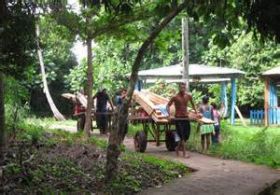Are there any programs for retirees regarding real estate purchases or real estate taxes in Nicaragua?
Gloria Pérez
Though there are no special programs for retirees regarding the acquisition of real estate, the Nicaraguan government provides other significant tax incentives through Law 694, "Law on Incentives for Retirees and Rentiers (people with private incomes)”, by which retirees may obtain the status of permanent residents and take advantage of some tax benefits, such as:
- the exemption for sales tax (IVA) on construction materials when building a house for...
Though there are no special programs for retirees regarding the acquisition of real estate, the Nicaraguan government provides other significant tax incentives through Law 694, "Law on Incentives for Retirees and Rentiers (people with private incomes)”, by which retirees may obtain the status of permanent residents and take advantage of some tax benefits, such as:
- the exemption for sales tax (IVA) on construction materials when building a house for personal use for up to US$ 50,000;
- the tax exemption of up to US$ 20,000 on importation of household goods; and
- the purchase of a vehicle for personal use with no import or sales taxes due for up to $ 25,000.00, among others.
This special tax treatment is definitely a great opportunity for retirees looking forward to live in Nicaragua and to save some money while obtaining the status of permanent residents.
Posted March 19, 2014
Brett DeGreen - Century Twenty One Gold Coast Realty Nicaragua
There is a tax incentive program specifically for retirees moving to Nicaragua, called Decree NO. 628. Some of the incentives for retiring to Nicaragua (according to Decree Number 628, the “Law of Resident Pensioners and Retirees”) include:
- No taxes on any out-of-country earnings;
- The ability to bring up to $10,000 worth of household goods for a retiree's own home, duty-free;
- The import of one car for personal or general use without...
There is a tax incentive program specifically for retirees moving to Nicaragua, called Decree NO. 628. Some of the incentives for retiring to Nicaragua (according to Decree Number 628, the “Law of Resident Pensioners and Retirees”) include:
- No taxes on any out-of-country earnings;
- The ability to bring up to $10,000 worth of household goods for a retiree's own home, duty-free;
- The import of one car for personal or general use without import tax or protective tariff, and after five years, the car can be sold again exempt from consumer sales tax;
- The import of an additional vehicle every five years under the same tax exemptions; and
- Foreigners are eligible for benefits if he/she is over 45 years of age and has a monthly income of at least US $400 (an additional $100 for each dependent family member in Nicaragua).
However, the paperwork and process to receive these credits does take patience and time. Like many things in Nicaragua, you need to have a good lawyer who can help you navigate the system before you pack up that container!
Posted June 16, 2014
Eddy Marin-Ruiz - The Mortgage Store Nicaragua
 There are no programs for retirees regarding real estate or real estate taxes in Nicaragua, but there are tax incentives for businesses in Nicaragua.
There are no programs for retirees regarding real estate or real estate taxes in Nicaragua, but there are tax incentives for businesses in Nicaragua.Property taxes here are very low, but there is no specific tax break for expats that I am aware of. Property tax depends on what is called the city council, but it is a certain percentage of the assessed value of the property per year.
(On Little Corn Island, Nicaragua, where cars are not allowed,...
 There are no programs for retirees regarding real estate or real estate taxes in Nicaragua, but there are tax incentives for businesses in Nicaragua.
There are no programs for retirees regarding real estate or real estate taxes in Nicaragua, but there are tax incentives for businesses in Nicaragua.Property taxes here are very low, but there is no specific tax break for expats that I am aware of. Property tax depends on what is called the city council, but it is a certain percentage of the assessed value of the property per year.
(On Little Corn Island, Nicaragua, where cars are not allowed, men pull building lumber, pictured.)
Posted August 5, 2015


